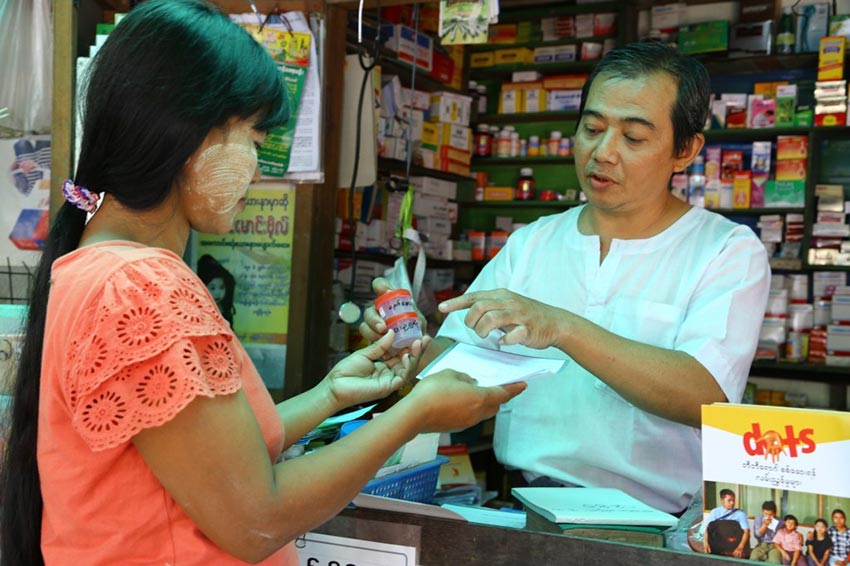
Photo Credit: FHI 360
In Cambodia, Chea Ru, a mother of five, suffered from classic tuberculosis (TB) symptoms of protracted cough, persistent fever, night sweats and profound weight loss. For more than a year, she was misdiagnosed and unsuccessfully treated by private for-profit providers, including traditional healers and doctors. Her health continued to decline and family finances suffered until, through FHI 360-supported community screening, she was finally correctly diagnosed.
TB has been curable for more than 70 years, yet it is the leading cause of death from an infectious disease, killing 1.6 million people in 2017. Stories like Chea Ru’s are all too common. One-third of those suffering from TB — an estimated 3.6 million people — are undiagnosed or unreported.
To end TB, finding and treating the missing people with TB will be critical. In high-burden countries with strong private sectors, 75 percent of people with TB symptoms seek care from private for-profit health providers. But many do not receive quality care, remain infectious, and may progress to advanced or multidrug-resistant TB (MDR-TB) or even die. Engaging the private sector, as highlighted in the World Health Organization’s END TB Strategy, is necessary to find and treat everyone with TB.
Why engage the private sector in national efforts to fight TB?
All TB patients deserve quality care, for their own health and to prevent infection in others. Many choose private care because of proximity, convenient hours, confidentiality, perception of quality and reduced financial burden from missed wages. But in many countries, the private sector is fragmented, poorly engaged with national TB programs and largely unregulated.
Private-sector providers may not employ diagnostics, treatment or follow-up according to national standards or report TB cases to national TB programs. As a result, there may be missed or late diagnoses, incorrect prescribing, inappropriate discontinuation of treatment and low TB case notifications. In addition, financing systems may promote disincentives to quality care and lack accountability checks.
Private-sector engagement yields critical opportunities to identify presumptive TB, rapidly and accurately diagnose active TB and support patients to complete treatment, with providers being held accountable to standards.
What is needed to engage the private sector?
Countries should recognize private-sector contributions to TB care and develop supportive policies and regulatory frameworks that incentivize quality and compliance through financial and nonfinancial elements. Private providers cherish their autonomy, and profit-making is central to their operations. Any successful private-sector engagement must recognize these factors. Enforcement of regulations, such as mandatory notification, is also imperative to ensure missing people are identified.
Tailored public-private-mix approaches can improve TB case detection and treatment outcomes, where national TB programs can partner with intermediaries and key stakeholders. In addition, digital technologies and innovations, which have revolutionized many aspects of TB diagnosis and care, should be more widely introduced in the private sector.
New financing mechanisms, such as social health insurance and strategic purchasing, are expanding as countries progress toward universal health coverage. These mechanisms also require strong monitoring within the private sector. As public-private-mix interventions can increase treatment success rates by 60 percent and are no longer considered optional, they should be integrated into core budgets and national funding mechanisms with the national TB program assuming a stewardship role for TB care across the health system.
How does FHI 360 support private for-profit TB engagement?
FHI 360 is stepping up to the challenge to end TB. We lead projects with TB private-sector engagement in several high-burden countries, including Cambodia, Indonesia, Myanmar, Nigeria and the Philippines. Our work, which illustrates many essential principles of private-sector engagement, includes operationalizing mandatory TB notification; working with drug sellers to screen and refer presumptive cases; scaling up primary health care coordination models; and designing and implementing workplace interventions. We also support governments to develop and operationalize national public-private-mix action plans.
To help more people like Chea Ru access timely, accurate TB diagnosis and correct, complete treatment, public-private-mixes should be expanded further in all high-burden countries with significant private sectors. As people continue to seek care from private providers, engagement of this important health sector is needed to end the TB epidemic.
Learn more about our TB programs around the globe.
